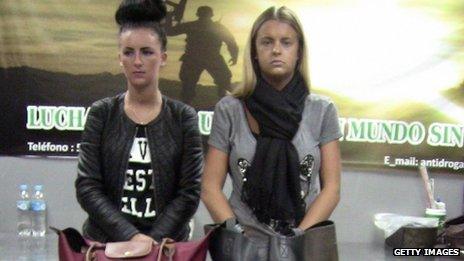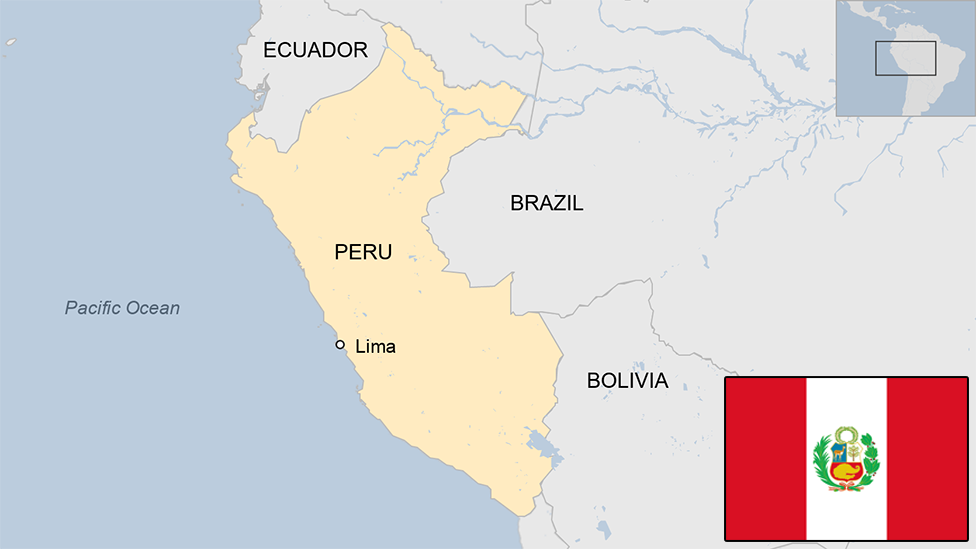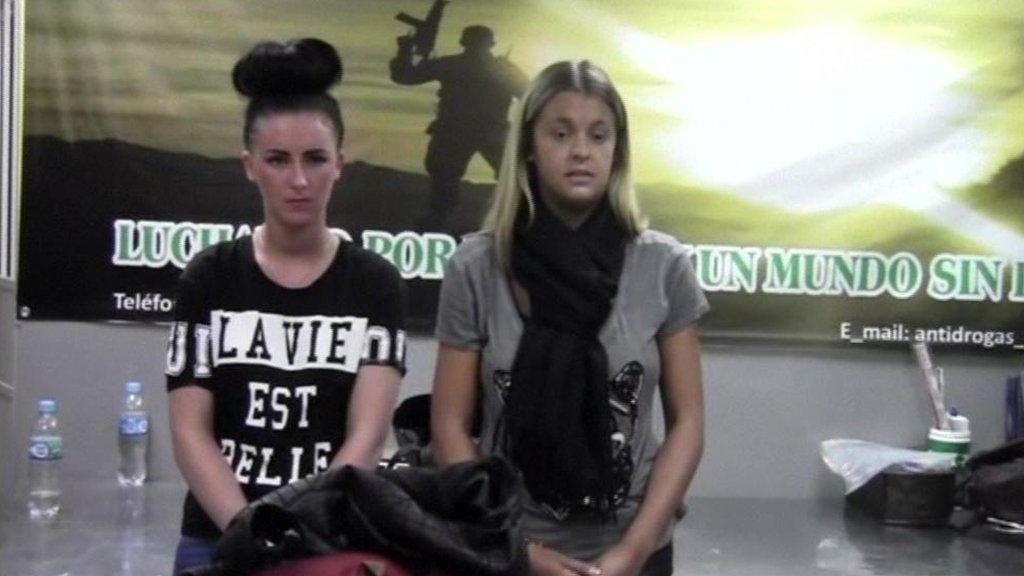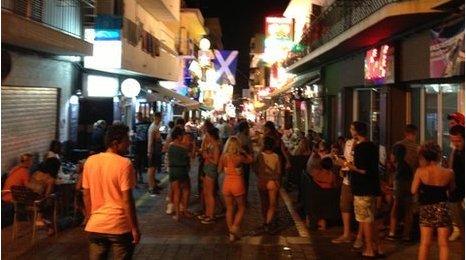Peru drugs case: What is it like doing time in Lima's Ancon 2?
- Published
Inside Ancon 2 prison, which is located on the outskirts of the capital Lima
Two UK women suspected of drug smuggling could spend time at Ancon 2, a prison where many foreigners are detained. What is it like there?
For inmate Lillian Allen, the story of Michaella McCollum and Melissa Reid's arrest at Lima's airport for allegedly carrying some 11kg (24lb) of cocaine has brought back some painful memories.
Blinking back the tears, the 48-year-old Northern Irish woman remembers her own arrest as she tried to board a plane out of Peru. She did not realise it at the time, she says, but she was acting as a drug mule.
"I came here to meet someone and he asked me to take some bags back for his brother," she recalls wearily, as though the memory itself is weighing her down.
"I looked at the bags he gave me and they were just normal handbags, children's schoolbags. I never saw anything inside."
Stitched into the lining, however, was about 8kg (17lb) of cocaine. When Lillian reached the departure gate, the authorities stopped her in her tracks.
'You have drugs'
"They said: 'You have drugs'. I said 'No'. I went with them and they took my suitcases out. They put a cotton bud inside the bags, and took it out and said 'coca'," she explains.
For carrying the cocaine, Lillian was eventually sentenced to eight years in prison. She paid a lawyer to help her plead her innocence but his advice was simple: "You have to say you're guilty to get a shorter sentence."
Lillian tells me her story on a cold concrete bench in the women's wing of Ancon 2, a prison on the outskirts of Lima. A modern facility, it does not yet suffer from the endemic problems of other jails in Latin America, namely overcrowding and crumbling infrastructure.
The majority of foreign women in prison in Peru used to be housed in Santa Monica jail in Chorrillos. It was notorious for its crowded and unsanitary conditions, and the prison authorities have started to move many of the detained foreigners to Ancon 2.
There are currently 325 foreign inmates in the jail, more than 100 of them women, most of whom are there on drug charges.
Ms Reid and Ms McCollum are likely to spend some time there, even if they are eventually cleared.

Melissa Reid and Michaella McCollum, both 20, are accused of trying to smuggle £1.5m worth of cocaine
The stories are frequent and familiar. Anna, not her real name, told me that a year ago, she came to Peru for eight days with her then-boyfriend. She says he planted drugs in their luggage as they travelled back to Spain and has since refused to support her claim that she knew nothing about the cocaine.
It is a common theme - women trapped by unscrupulous men who make others take the risk, and the blame, for smuggling drugs.
'Constant fight'
Lillian Allen: "They cut the bags open and the cocaine fell on the floor"
The prison library is staffed by two friendly European girls, no older than Ms Reid and Ms McCollum. They explained how the economic crisis at home had pushed a lot of women into running risks they might have otherwise avoided.
"Pay off all your debts at once," one of the girls, from Madrid, told me with an ironic grin. The debt she is paying now will run into years.
She has formed a close bond with her Italian cellmate, but says every day in Ancon 2 is a struggle to stay sane.
"We were just saying to each other before you came in, this place is a constant fight to keep from going mad," she says.
Drug smuggling can attract long sentences, and the frustratingly slow pace of the legal system is like an endurance test of their patience, they say. But they try to stay positive by listening to their music as they put the library books in order, and planning trips they hope to take together when they get out.
When the talk turns to the two UK girls, they have both heard of their case.
"Even if they didn't do it, they may as well confess. It'll be easier in the long run," they explain. "I hope they come here - we'll look after them."
'Little girl'
Lillian Allen, though, is the inmate in the jail who perhaps most identifies with the two young women, particularly with her Northern Irish compatriot, Michaella McCollum.
"I always said I never wanted another girl to come in here from my country," she says, wiping a tear from her cheek.
"She's young, she's only a little girl. She could be my daughter, she's younger than my sons."
Regardless of whether Michaella McCollum's claim to have been kidnapped and forced into carrying cocaine by gangsters is believed by the Peruvian authorities, it is likely to take a long time for her - and Melissa Reid - to extricate themselves from the country's tangled legal system.
"I will help them," says Lillian wrapping the white scarf she knitted in one of the prison workshops around herself a little more tightly as if for comfort.
Barring an unprecedented dismissal of the charges against them, they are going to need it.
- Published4 September 2023

- Published17 August 2013

- Published15 August 2013

- Published13 August 2013

- Published1 October 2010